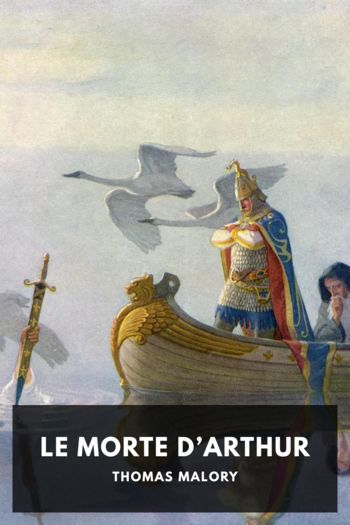A Gentleman of Leisure, P. G. Wodehouse [speld decodable readers .TXT] 📗

- Author: P. G. Wodehouse
Book online «A Gentleman of Leisure, P. G. Wodehouse [speld decodable readers .TXT] 📗». Author P. G. Wodehouse
One afternoon, a year after the events recorded in the preceding chapter, he was in his private room, looking out of the window. The view from that window was very beautiful. The castle stood on a hill, the lower portion of which, between the house and the lake, had been cut into broad terraces. The lake itself, with its island with the little boathouse in the centre, was a glimpse of Fairyland.
But it was not altogether the beauty of the view that had drawn Sir Thomas to the window. He was looking at it more because the position enabled him to avoid his wife’s eye; and, just at the moment, he was rather anxious to avoid his wife’s eye. A somewhat stormy board meeting was in progress, and Lady Julia, who constituted the board of directors, had been heckling the chairman. The point under discussion was one of etiquette, and in matters of etiquette Sir Thomas felt himself at a disadvantage.
“I tell you, my dear,” he said to the window, “I am not easy in my mind.”
“Nonsense!” snapped Lady Julia. “Absurd! Ridiculous!”
Lady Julia Blunt, when conversing, resembled a Maxim gun more than anything else.
“But your diamonds, my dear?”
“I can take care of them.”
“But why should you have the trouble? Now, if we—”
“It’s no trouble.”
“When we were married there was a detective—”
“Don’t be childish, Thomas. Detectives at weddings are quite customary.”
“But—”
“Bah—”
“I paid twenty thousand pounds for that rope of pearls,” said Sir Thomas obstinately. Switch things onto a cash basis and he was more himself.
“May I ask if you suspect any of our guests of being criminals?” inquired Lady Julia, frostily.
Sir Thomas looked out of the window. At the moment the sternest censor could have found nothing to cavil at in the movements of such of the house party as were in sight. Some were playing tennis, some clock golf, and others were smoking.
“Why not,” he began.
“Of course. Absurd! Quite absurd!”
“But the servants. We have engaged a number of new servants lately.”
“With excellent recommendations.”
Sir Thomas was on the point of suggesting that the recommendations might be forged, but his courage failed him. Julia was sometimes so abrupt in these little discussions. She did not enter into his point of view. He was always a trifle inclined to treat the castle as a branch of Blunt’s Stores. As proprietor of the stores he had made a point of suspecting everybody, and the results had been excellent. In Blunt’s Stores you could hardly move in any direction without bumping into a gentlemanly detective efficiently disguised. For the life of him Sir Thomas could not see why the same principle should not obtain at Dreever. Guests at a country house do not as a rule steal their host’s possessions, but then it is only an occasional customer at a store who goes in for shoplifting. It was the principle of the thing, he thought. Be prepared against every emergency. With Sir Thomas Blunt suspiciousness was almost a mania. He was forced to admit that the chances were against any of his guests exhibiting larcenous tendencies, but, as for the servants, he thoroughly mistrusted them all except Saunders, the butler. It had seemed to him the merest prudence that a detective from a private inquiry agency should be installed at the castle while the house was full. Somewhat rashly he had mentioned this to his wife, and Lady Julia’s critique of the scheme had been terse and unflattering.
“I suppose,” said Lady Julia sarcastically, “you will jump to the conclusion that this man whom Spennie is bringing down with him today is a criminal of some sort?”
“Eh? Is Spennie bringing a friend?”
There was not a great deal of enthusiasm in Sir Thomas’s voice. His nephew was not a young man whom he respected very highly. Spennie regarded his uncle with nervous apprehension, as one who would deal with his shortcomings with vigour and severity. Sir Thomas, for his part, looked on Spennie as a youth who would get into mischief unless he had an eye fixed on him. So he proceeded to fix that eye.
“I had a wire from him just now.”
“Who is his friend?”
“He doesn’t say. He just says he’s a man he met in London.”
“H’m!”
“And what does ‘H’m!’ mean?” demanded Lady Julia.
“A man can pick up strange people in London,” said Sir Thomas judicially.
“Nonsense.”
“Just as you say, my dear.”
Lady Julia rose.
“As for what you suggest about the detective, it is, of course, absolutely absurd.”
“Quite so, my dear.”
“You mustn’t think of it.”
“Just as you say, my dear.”
Lady Julia left the room.
What followed may afford some slight clue to the secret of Sir Thomas Blunt’s rise in the world. It certainly suggests singleness of purpose, which is one of the essentials of success.
No sooner had the door closed behind Lady Julia than he went to his writing-table, took pen and paper, and wrote the following letter:
To the Manager, Wragge’s Detective Agency, Holborn Bars, London, E.C.
Sir—With reference to my last of the 28th ult., I should be glad if you would send down immediately one of your





Comments (0)